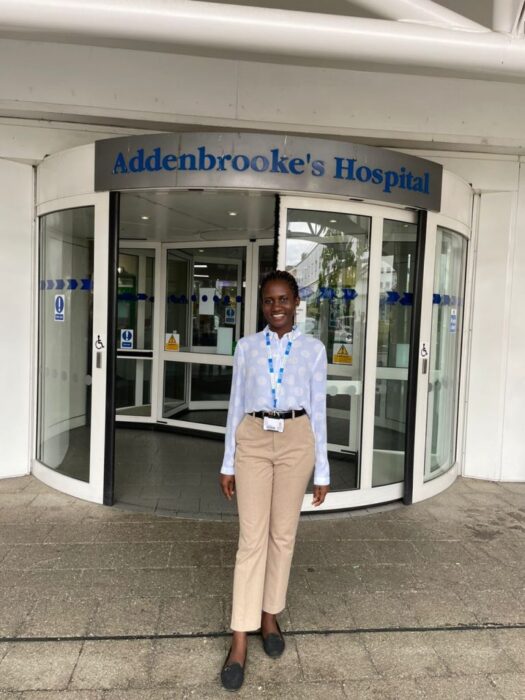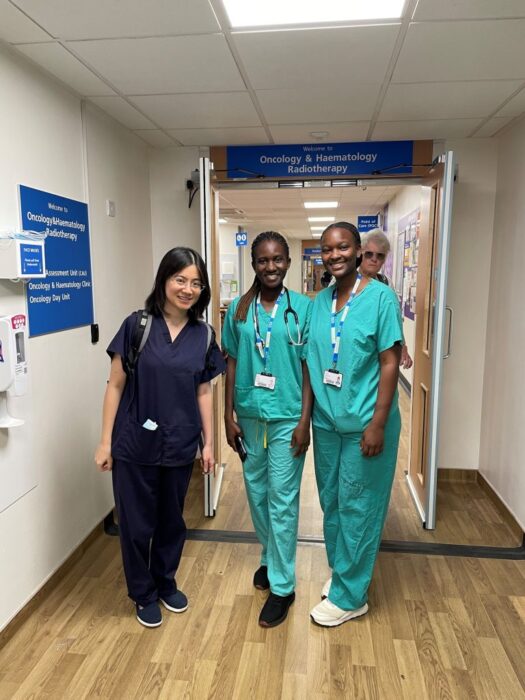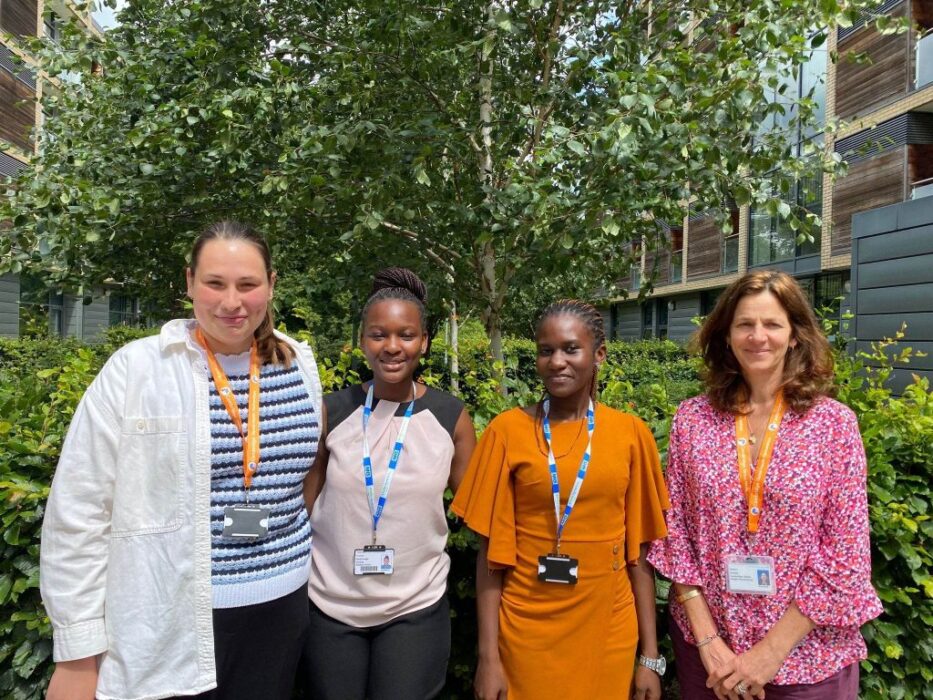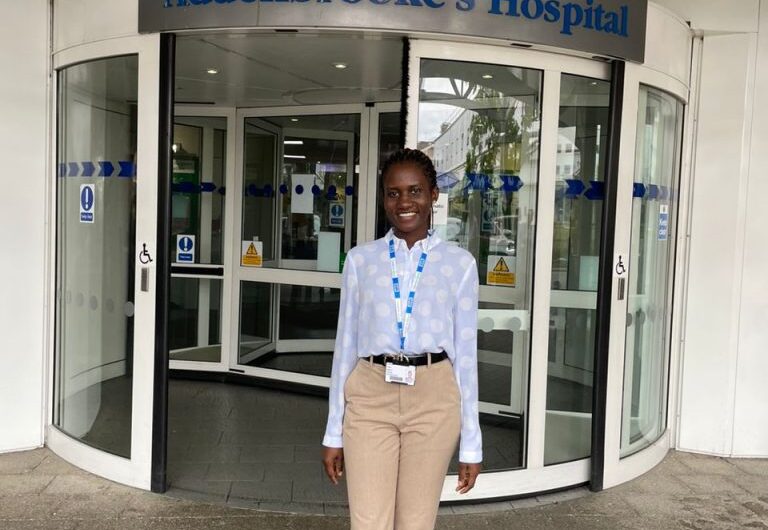Interview with Stella Nakaye
Stella Nakaye is a fourth-year medical student from Makerere University, Uganda, pursuing a bachelor’s degree in medicine and surgery. Alongside Yvonne Nakibirango she visited the Cambridge Biomedical Campus for six weeks this summer to complete an ethical elective in oncology and haematology – made possible by Cambridge Global Health Partnerships, Cambridge-Africa, and with funding from the Thriplow Charitable Trust.
Here Stella talks to CGHP about the differences between the British and Ugandan hospital system, the skills she was able to put into practice, and the knowledge she’s taking home.
Why did you want to undertake an elective in the UK?
I wanted to experience contemporary global health practices, and I thought the UK would be the ideal location to do so. I wanted this experience to have an impact on my journey toward becoming a skilled doctor and providing the best care possible to the people of Uganda, so when the chance to attend Cambridge University presented itself, I had to take it. Moreover, I love traveling!

What has been the biggest surprise about the UK hospital system?
The level of technology on display in the UK healthcare system was my biggest surprise. Starting with the Epic system of record keeping, a secure, online platform where patient clinical information regarding their illness and management is kept. Doctors can communicate various issues concerning the patient, or communicate between departments, for example, the radiology department and the laboratory department can upload results to the system without the hassle of physical movements. Doctors typically speak their findings to the voice recognition equipment, which then shows the notes, rather than physically typing them out. And the hospital door cards that authorize admission to the various departments ensure that a person only enters a unit if they must.
What skills or knowledge acquired in Uganda were you able to put into place here?
As a fourth-year medical student in Uganda, the emphasis is on being able to take a patient history chronologically and make clinical sense out of it, examine patients physically and report findings, request the necessary investigations while having to justify your request, and suggest a treatment plan while under supervision. The ethical aspects of medical practice are also emphasized, such as patient autonomy, confidentiality, informed consent, beneficence, and non-maleficence. Additionally, infection control practices were emphasized.
Therefore, even during my practice as a visiting medical student, I was able to take patient histories and present them to the attending consultant. I was also able to examine patients and report findings, suggesting investigations as well as a management plan that I would follow if I were the attending doctor.

I was also able to follow the ethical aspects of medical practice, such as patient autonomy (I would only be in the clinical rooms if the patients agreed), confidentiality, and informed consent (for instance, requesting patients’ permission before doing anything).
In order to ensure the highest level of patient safety, I strictly adhered to the infection control procedures that I was taught in Uganda, such as hand washing and donning an apron and mask when visiting patients’ rooms. This is especially important for oncology and haematology patients, who typically have low blood counts. I have also been able to implement the fundamental principles of family medicine, such as compassion, empathy, and continuing patient care.
What key skills or processes will you take back to Uganda with you?
- The appointment scheduling process, so that the doctors know which patients are coming for treatment on a specific day and time to avoid any delays or issues, such as those who arrived late sneaking in before those who arrived early, or patients leaving the hospital without being attended to at the end of the day simply because the numbers were too high for the attending clinician.
Each patient is assigned to a specific nurse who acts as their point of contact so that in the event of an emergency, the patient has someone in the hospital who is most familiar to them. This allows for proper patient care. - Effective doctor-patient communication to ensure that patients have all the information they require and all available treatment options for them to make the best decisions. I learned this from the UK, where newly-diagnosed patients are typically given a booklet with all the information they need to know about their diagnosis and management plans so that they are completely aware of what is happening.
- More involvement of clinicians in research processes as they are in the greatest position to produce the best results since they are familiar with the patients that the research is meant to benefit. I further attested to this when Dr Martin Besser took us to the Cambridge Clinical Research Centre to see a patient in his care who was on the experimental drug mitapivat.
- Application of genetic research in patient management (targeted therapy) as this has proved to be very useful in the management of some forms of rare cancer with a genetic correlate. This can be made possible by promoting the establishment of a genetics institute where students can receive training or pursue careers in genetics. (At first I was startled when one of the other elective students told me she had come for an elective in genetics. It seemed unusual to select that of all specialisations, but at the conclusion of the placement, I realised it makes sense as I have learned how important it can be). I further attested to this since Dr Bulusu Ramesh, one of the experts on gastrointestinal stromal tumors (GIST), had a patient with an unusual kind of this type of cancer. He had created a specific type of therapy that targeted the mutation, and the patient had been well ever since.
- Organisation of team meetings that can be attended by consultants, doctors, nurses, psychologists, and patients so that a patient doesn’t only see a doctor when he or she is gravely ill but has some form of free time where they can hold an open discussion about all aspects of life, the future treatment plans, and so that patients know they are not alone. We attended a team conference for sickle cell disease and it was a wonderful experience.
I want to express my gratitude to the patients and the consultants, registrars, nurses, and secretaries who welcomed me, especially those at the medical library. Many doctors have helped me academically at the wards and clinics, and some have even gone so far as to organise special teachings with me. I would love to name a few of them. Drs Martin Besser, Huiqi Yang, Mark Robinson, George Follows, Alan Waren, Bulusu Ramesh, Fiona Haris, Duncan Brian, and Drs Emily Symington, together with Drs Camilleri Marquitta, Andrew King, James Brenton, Emmy Dickens, and Will Thomas Drs Hellen, Cecilia, and Luke, along with everyone else I was unable to name.

Stella and Yvonne with CGHP Programme Officer Alyshia Gouldsbrough and Director Evelyn Brealey.
What has been your proudest moment?
I was proud throughout the entire placement having dreamed of a placement abroad since year one of medical school: a close friend of mine had one and his story was so inspiring. However, my proudest moment was when I attended the Cambridge Global Health Partnership meeting, which was held on 6 July 2023, with the various stakeholders. It might seem insignificant, but every student would like to attend such a gathering, and since I was one of just two undergraduate students there, I honestly didn’t think it was me! I found it quite inspiring to learn that most of the attendees at the meeting were once medical students just like me, and I look up to them.
How important is funding in making an overseas elective possible?
Funding of the placement is a very crucial step that is required to have a placement abroad. Many students would dearly love to have such placements but are constrained by limited funds. I personally wouldn’t have been able to secure this placement if it weren’t for Cambridge Global Health Partnerships and Cambridge-Africa, who came forward to provide me with the funds I needed, including the plane tickets, visa fees, accommodation, health insurance, and a living allowance. I am extremely appreciative of their assistance.
Return to blogs

